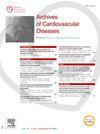Impact of baseline renal function on long-term outcomes after acute myocardial infarction
IF 2.3
3区 医学
Q2 CARDIAC & CARDIOVASCULAR SYSTEMS
引用次数: 0
Abstract
Introduction
The cardiac prognosis, particularly coronary, is overshadowed by the presence of chronic kidney disease, which is increasingly recognized as a major cardiovascular risk factor.
Objective
The objective of this study is to demonstrate the involvement of renal function in cardiovascular risk.
Method
Our study includes 244 patients admitted to the cardiology department of the main military hospital of Tunis for acute coronary syndrome, divided into two groups: group 1 comprises 188 patients with a glomerular filtration rate (GFR)≥ 60 mL/min, and group 2 contains 41 patients with GFR < 60 mL/min.
Results
The mean age of patients included in the study is 62.09 years with a male predominance, yielding a sex ratio of 1.65. It's noted that a history of smoking, dyslipidemia, stroke, and/or hypertension is more prevalent among patients with renal insufficiency. Patients with a GFR < 60 mL/min significantly experienced more cardiovascular events (16.1% in group 2 compared to 5.4% in group 1; P = 0.049) with a higher number of subsequent hospitalizations (53.8% had a hospital stay of more than 3 days). In multivariate analysis, renal insufficiency is an independent predictor of cardiovascular events (P = 0.05). Among patients with chronic kidney disease, a history of stroke (P = 0.037), primary angioplasty (P = 0.000), and/or coronary revascularization surgery (P = 0.016) were predictive factors of long-term major events.
Conclusion
The findings of our study confirm that baseline renal function is a potent predictor of long-term events after myocardial infarction, highlighting the need to include renal function in the assessment of cardiovascular risk and to tailor the management of patients admitted for acute myocardial infarction accordingly.
基线肾功能对急性心肌梗死后长期预后的影响
心脏预后,特别是冠状动脉,被慢性肾脏疾病的存在所掩盖,慢性肾脏疾病越来越被认为是一个主要的心血管危险因素。目的:本研究的目的是证明肾功能与心血管风险的关系。方法选取244例在突尼斯主要军队医院心内科收治的急性冠脉综合征患者,分为两组:1组肾小球滤过率(GFR)≥60 mL/min患者188例,2组肾小球滤过率≥60 mL/min患者41例;60毫升/分钟。结果纳入研究的患者平均年龄为62.09岁,男性居多,性别比为1.65。值得注意的是,吸烟、血脂异常、中风和/或高血压史在肾功能不全患者中更为普遍。GFR <患者;60 mL/min显著增加心血管事件发生率(2组为16.1%,1组为5.4%;P = 0.049),后续住院次数较高(53.8%住院时间超过3天)。在多变量分析中,肾功能不全是心血管事件的独立预测因子(P = 0.05)。在慢性肾脏疾病患者中,卒中史(P = 0.037)、初次血管成形术(P = 0.000)和/或冠状动脉重建术(P = 0.016)是长期主要事件的预测因素。结论:我们的研究结果证实,基线肾功能是心肌梗死后长期事件的有效预测因子,强调在心血管风险评估中纳入肾功能的必要性,并相应地调整急性心肌梗死患者的管理。
本文章由计算机程序翻译,如有差异,请以英文原文为准。
求助全文
约1分钟内获得全文
求助全文
来源期刊

Archives of Cardiovascular Diseases
医学-心血管系统
CiteScore
4.40
自引率
6.70%
发文量
87
审稿时长
34 days
期刊介绍:
The Journal publishes original peer-reviewed clinical and research articles, epidemiological studies, new methodological clinical approaches, review articles and editorials. Topics covered include coronary artery and valve diseases, interventional and pediatric cardiology, cardiovascular surgery, cardiomyopathy and heart failure, arrhythmias and stimulation, cardiovascular imaging, vascular medicine and hypertension, epidemiology and risk factors, and large multicenter studies. Archives of Cardiovascular Diseases also publishes abstracts of papers presented at the annual sessions of the Journées Européennes de la Société Française de Cardiologie and the guidelines edited by the French Society of Cardiology.
 求助内容:
求助内容: 应助结果提醒方式:
应助结果提醒方式:


